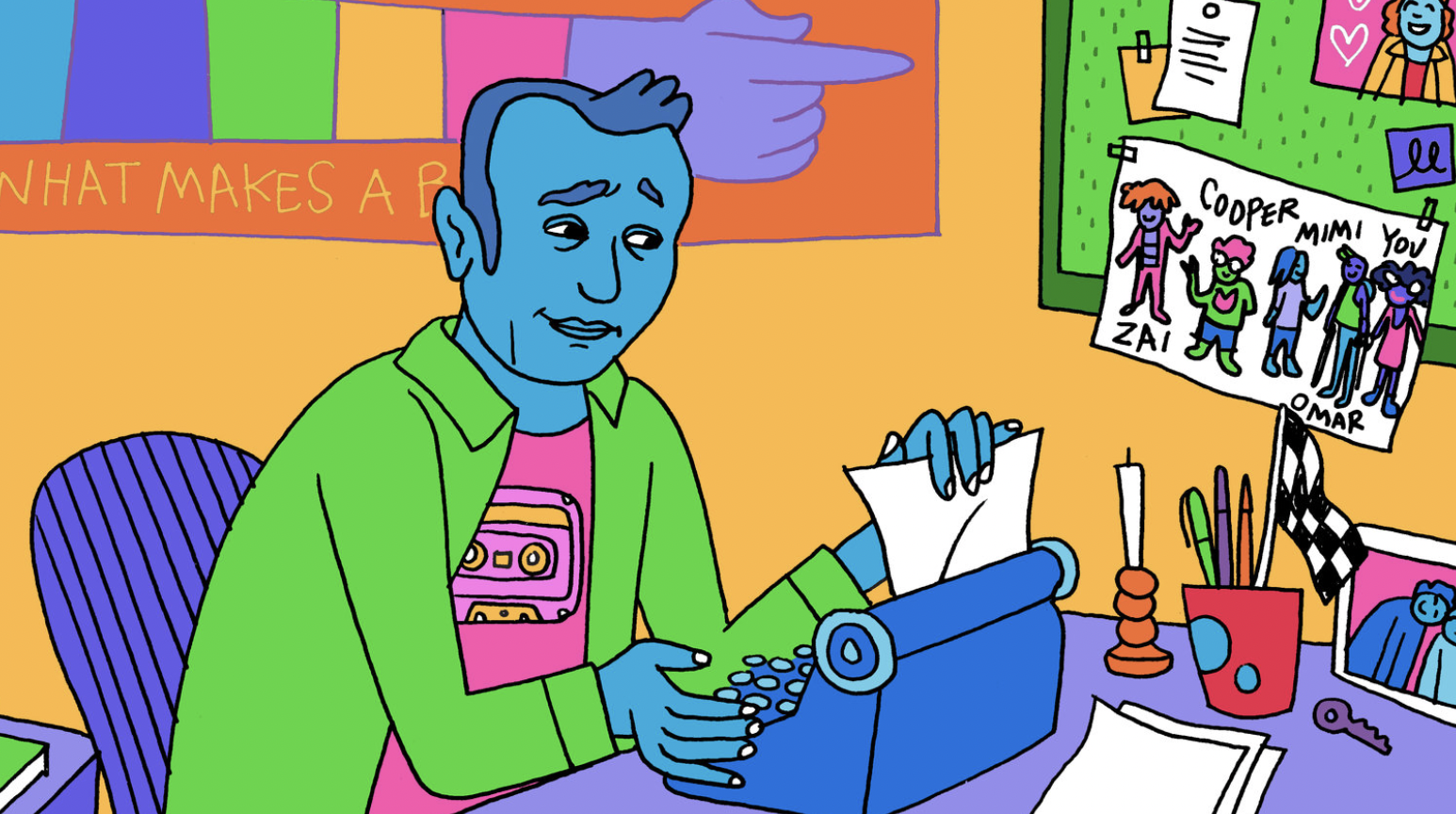
Cory Silverberg On How to Talk about the Things We Don’t Want to Talk About
Cory Silverberg is a Canada-based sex educator and writer who helps kids (and adults!) talk about sex, gender and justice in meaningful and approachable ways. After decades facilitating conversations in classrooms, they began creating comprehensive sex education books for readers of all ages and backgrounds.
Their latest book, You Know, Sex (Seven Stories Press, 2022), is illustrated by Fiona Smyth and offers a diverse exploration of “young people’s experiences of pressures and joy, risk and reward, and confusion and discovery.”
They talked to Arielle Silver-Willner about their work.
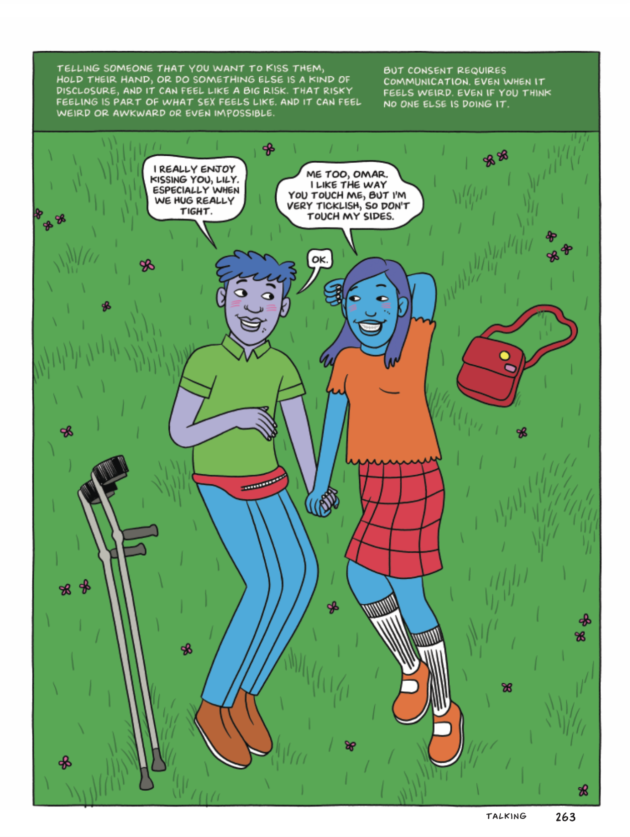
Arielle Silver-Willner: You’ve written some pretty revolutionary sex education books–can you talk a bit about what led you here?
Cory Silverberg: I grew up with parents who were open to talking about sex, but I didn’t get the sex education I needed, which would’ve included stuff about gender. I’ve assumed–or hoped–that better books would get written, but by the time I started having kids, they had not. There was no book about where babies come from that were written for my life or my community–all the books said that sperm comes from the dad and the egg comes from the mom, and you have two parents that are married and they love each other, that it’s easy to make a baby, and all these other things that are not true for many of us. So I wrote a story for a friend’s kid about how you make babies, including things like surrogacy, single-parent families, families using fertility support–and it became clear there was a huge need for books like this. The book, called What Makes a Baby, went viral, and Fiona Smyth and I signed a three-book contract with Seven Stories.
ASW: How do you create sex ed material that includes stuff about gender, especially in a world that still has so much sexism and hatred toward trans folks?
CS: I try to find a balance between writing for the world we live in and the world I want us to live in. When it comes to attitudes toward talking about sex and gender, I write for the world I want to live in. When I write about gender, I write about “boys, girls, and the rest of us,” and I do that because you have to start with the binary, because that’s where we live. But we want kids (and adults!) to know that there are more than two options, and there’s always more coming.
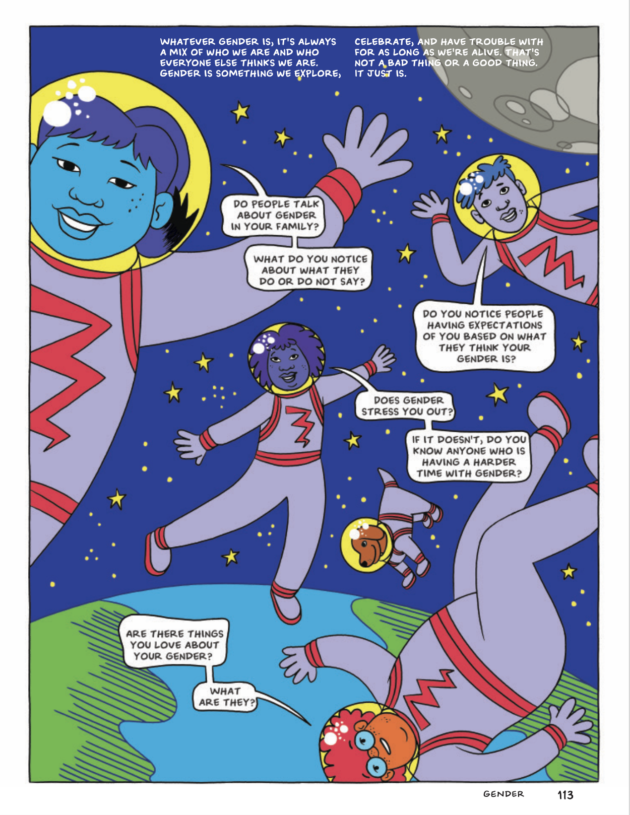
ASW: Are there other ways that your books differ from the puberty and sex ed books we might’ve read growing up?
CS: A lot of sex education materials will say, “So and so is curious [about sex],” and there’s a “record scratch” moment where they’re frozen with fear, they don’t know what to do, and then the older sibling comes in and says, “Don’t worry, I’m going to explain it all to you.” That’s a problem. There isn’t any one person who can explain it all. I hope to change how fraught this stuff is by showing a world where we struggle together. I also show a world where all of our feelings get acknowledged–adults are messed up, we ask direct questions of young people–we’re giving young people their due. A lot of sex education is based in adult supremacy and the idea that a young person is not a full person.
We center young people’s knowledge–we say, “No one knows you like you do.” And I think that’s particularly powerful for queer kids because they’re gaslit all the time to believe that they don’t know anything. But we say, “You know a lot, and what you know not only matters, but has everything to do with these words, ‘sex’ and ‘gender,’ and we’re gonna show you how they’re connected.” Kids already know things–what we need to do is give them language and support them. I want them to see themselves.
The way our books work is, every chapter ends with a page of questions. This is because the sex education that we need is not biomedical. The real questions in sex education–How do I build relationships? And, how do I deal with rejection? What do I do with desire?—I can’t give young people the answers. The answers have to come from within their community and within themselves and from people they trust and love. The only way to get at that is through questions. And this gift of being Jewish means that I love questions and I am happy to sit with questions. I understand, as an educator, questions being more useful than answers.
The other main reason we’re successful in this work is the comics–the form matters so much. It’s incredibly rich and very layered. You have so much going on in a frame–the basic information, but also the story and the feelings you can see on the characters’ faces.
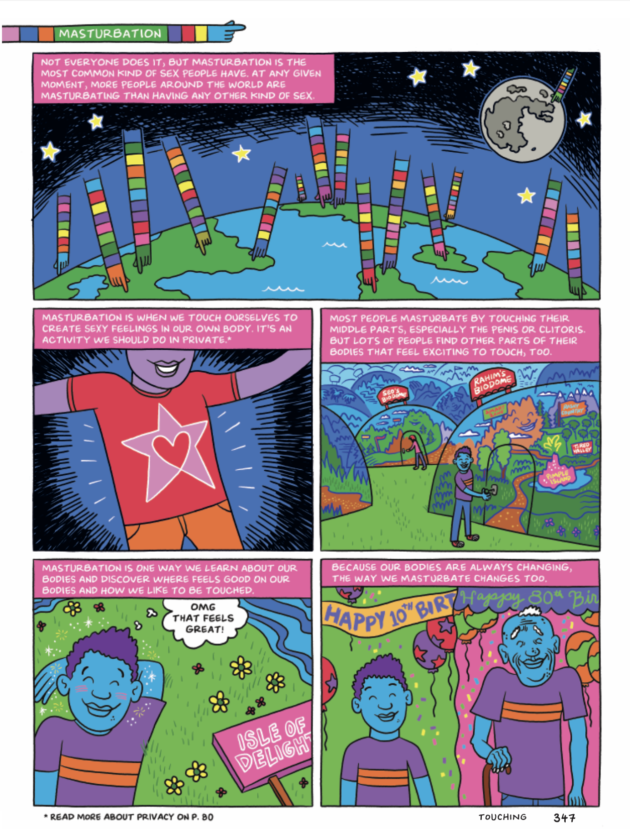
ASW: Let’s talk about some of the hard things. How do we break down the shame and stigma around subjects like consent, masturbation, pornography, etc., in a meaningful way, for young people?
CS: You can’t resist or talk about shame and stigma differently if you don’t have power in the world. Part of why sex education fails is that it doesn’t talk about race, religion, sexual oppression, or violence–except in a very narrow “stranger danger” sort of way. But we see all of that in You Know, Sex. There’s a chapter on shame, there’s a chapter on stigma, and we talk about how stigma falls on each of us differently, and we talk about where it comes from–ableism, racism, sexism, capitalism.
It works because kids already see all of this. A ten-year-old may not be fluent in the language of capitalism, but they know what it feels like to be different based on things like ableism, racism, sexism, religion, and class. Kids know what it feels like to not get called on by the teacher, or only be called out for something “disruptive.” Older kids know what it’s like to be followed around in stores by security or sales people because you look queer, or you’re not white. Kids know that “special education” is a euphemism for being less worthy of care. Kids pick up on the casual anti-Indigenous, racist and antisemitic comments made around them, even though the people making these comments may be unaware they are doing so or unaware that young people are impacted.
A lot of traditional sex education is also very de-contextualized. A teacher will say, “Today we’re going to learn about consent,” and then there are examples that don’t necessarily connect to our lives. In our chapter on consent in You Know, Sex, we begin with a scene where a character asks to borrow a pen. The teacher stops them and says, “That was an example of consent–someone asked you for something, you thought about it, made a decision, and then acted on that decision.” Then, the next ten pages are about that–they’re not about sexual assault or how to know when you’re ready to have intercourse–things that, for ten-year-olds, are much less relevant.
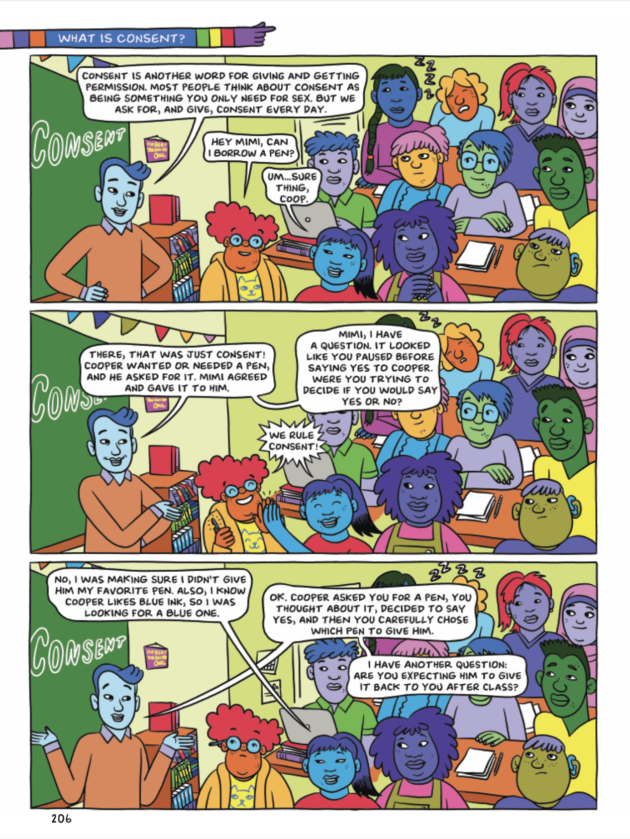
ASW: I’ve heard that you were raised by a children’s librarian and a sex therapist! How much did your parents and your upbringing contribute to the work you do now?
CS: We didn’t talk about sex all the time, but conversations were encouraged, questions were encouraged–and really never discouraged. It wasn’t that I had parents that had all the answers–they really didn’t–but I never thought there was a topic I couldn’t ask about.
I was also raised with a rich appreciation for fantasy–not necessarily sexual fantasy, but the ability to imagine the life I wanted and the idea that I got to make my own future. I didn’t know who I would have a future with, but knew that I didn’t have to follow the rules–that it was my job to question rules and that authorities were not always to be trusted–which is all a very Jewish experience. And it was the 70’s, so there was a challenging of gender norms [in my house]–we all helped clean the house and do the dishes–which was good for me to see.
ASW: I love the idea of being Jewish as a catalyst for asking questions–where else might you find Judaism within your perspectives on sex ed, justice, and the work you do?
CS: My family wasn’t religious. I went to a school with mostly Jewish kids and they were really mean to me, so I grew up with a pretty messed up connection to Judaism. And without any Jewish education, I didn’t learn that questioning everything is a fundamentally Jewish way of being. It wasn’t until later that I learned about things that I would recognize as being deep in my bones–and sometimes that happens with queerness, too.
My Jewish identity, similarly to my relationship to queerness, feels very new. If you asked me what my gender is, I would say, “Either give me a half hour or I’ll give you a word to use that won’t offend me,” because I still don’t fully understand it. The same is true of my experience of Judaism. I still don’t know all the ways being Jewish influences me. But I think it makes it much easier for me to write from a place of empathy and humility.
Writing is a way of figuring things out–I didn’t know how I wanted to talk about consent until I spent months working on the pages in my book about consent. Eventually, I hope to write a book about Judaism for kids that explores what it means to be Jewish, because we have so many beautiful children’s books on Jewish values and traditions, but I think kids deserve the space to ask this question and think through some answers.



